Introduction to Trade Futures
Trade futures have become a pivotal part of the financial landscape, providing traders an opportunity to engage with a variety of asset classes ranging from commodities to indices. As a prospective trader, grasping the fundamentals of futures trading is essential to navigating these complex markets effectively. Unlike traditional trading methods, trade futures involve agreements to buy or sell assets at predetermined prices on future dates. Understanding the nuances surrounding futures contracts can open new avenues for investment and risk management within the ever-changing financial markets.
What are Trade Futures?
At its core, a futures contract represents a legal agreement to buy or sell an asset at a specified future date at a predetermined price. These contracts are standardized and traded on exchanges, making them a unique financial instrument for speculators and hedgers alike. While futures originated primarily with commodities, today’s markets encompass a wide variety of financial instruments, including stock indices, currencies, and even cryptocurrencies.
The Role of Futures in Financial Markets
The role of futures in financial markets extends far beyond simple transactions. Futures contracts serve several essential purposes, including:
- Risk Management: Businesses use futures contracts to hedge against price fluctuations in commodities they rely on, mitigating risks associated with price volatility.
- Speculation: Traders can leverage their capital by speculating on future price movements of assets, seeking to generate profits from short-term price changes.
- Market Efficiency: Futures trading facilitates price discovery and enhances liquidity in underlying markets, thereby contributing to overall market efficiency.
Key Terminology in Trade Futures
Understanding futures trading requires familiarity with several key terms:
- Contract Size: This refers to the standardized quantity of the asset covered by a futures contract.
- Expiration Date: The date by which the contract must be fulfilled or settled.
- Margin: A good faith deposit required to open a position, allowing traders to leverage their investments.
- Hedging: The practice of taking an offsetting position in a futures contract to reduce risk.
- Speculation: Taking positions based on anticipated changes in market prices, rather than hedging against an existing risk.
Benefits of Trading Futures
Futures trading presents numerous advantages that can benefit both beginner and experienced traders.
Leverage and Margin in Futures Trading
One of the most appealing aspects of futures trading is the ability to use leverage. Traders are only required to deposit a fraction of the contract’s total value as margin. This leverage means that small price movements can result in significant gains (or losses). For instance, if a trader controls a $100,000 position with only $5,000 in margin, a 1% price move could yield a 20% return on the initial capital. However, this same leverage also increases risk, highlighting the importance of risk management strategies.
Hedging Against Market Volatility
Futures contracts offer an effective means for hedging against market volatility. Businesses, such as farmers or manufacturers, can lock in prices for their products or raw materials, thereby protecting themselves against unfavorable price movements. For example, a wheat farmer can sell futures contracts for their expected harvest, guaranteeing a price regardless of market fluctuations during the harvest season.
Diversification of Investment Portfolio
Incorporating futures into an investment strategy can enhance portfolio diversification. Unlike stocks or bonds, which may be correlated with broader market movements, futures can provide exposure to different asset classes. This diversification can mitigate overall portfolio risk, especially in volatile market conditions.
How to Start Trading Futures
Starting to trade futures requires careful planning and execution. Here are essential steps to consider:
Choosing the Right Futures Broker
Selecting a suitable broker is paramount when embarking on futures trading. Consider factors such as commissions, trading platforms, and access to research tools. It’s essential to work with brokers that offer robust educational resources and responsive customer support, especially for aspiring traders.
Setting Up a Trading Account
Once a broker is chosen, traders need to set up a trading account. This process typically involves providing personal information and possibly verifying identity through documentation. Traders should be prepared to understand the different account types available—such as individual or joint accounts—and select one that aligns with their trading goals.
Developing a Trading Strategy
Having a well-defined trading strategy is critical to success in futures trading. This plan should outline trading goals, preferred asset classes, risk tolerance, and specific entry and exit points. Traders should also incorporate techniques such as stop-loss orders to manage risk effectively. Backtesting strategies against historical market data can aid in validating their effectiveness.
Common Challenges in Futures Trading
While futures trading offers advantages, it also comes with challenges that traders must navigate carefully.
Understanding Market Volatility
Market volatility can significantly impact futures prices, leading to rapid fluctuations. Traders must understand the intricacies of volatility and how it affects their positions. This awareness can help traders react appropriately to sudden market changes and adjust their strategies accordingly.
Managing Risks Effectively
Effective risk management is essential in trading futures due to the inherent leverage involved. Strategies such as setting predetermined profit targets, utilizing stop-loss orders, and only risking a small percentage of total capital on individual trades can help manage risks. It’s crucial to maintain discipline and avoid emotional decision-making that can lead to substantial losses.
Staying Informed with Market News
Successful futures traders must stay informed about global economic events, regulatory changes, and specific news that could influence markets. Subscribing to financial news platforms, engaging with market analysts, or utilizing analysis tools can provide valuable insights that inform trading decisions.
Advanced Techniques in Trade Futures
For traders looking to enhance their futures trading proficiency, several advanced techniques can be invaluable.
Technical Analysis Tools for Futures
Technical analysis plays a vital role in futures trading, enabling traders to analyze price movements and identify patterns. Tools such as trend lines, moving averages, and oscillators provide insights into potential future price actions. Learning to use charting software can enhance analytical capabilities, allowing traders to make informed decisions based on historical data.
Implementing Algorithms in Futures Trading
Algorithmic trading, or automated trading, employs computer programs to execute trades based on predetermined criteria. Algorithms can analyze vast datasets to identify trading signals, potentially maximizing profitability while minimizing human error. Traders should ensure they possess a basic understanding of coding or partner with expert developers to create tailored trading algorithms.
Building a Long-Term Trading Plan
Establishing a long-term trading plan is crucial for achieving sustained success in futures trading. This plan should encompass trading goals, risk management protocols, and a diversified approach to asset selection. Regular reviews of trade performance and strategy adjustments based on evolving market conditions can help traders remain adaptable and aligned with their financial objectives.
Conclusion
Trade futures offer unique opportunities for both hedging and speculation, allowing traders to navigate complex financial landscapes effectively. Despite the risks associated with leverage and market volatility, the potential rewards can be significant for those who approach trading with diligence, education, and strategy. As the markets continue to evolve, staying informed, implementing strong risk management practices, and continually refining trading strategies will be essential for long-term success.



